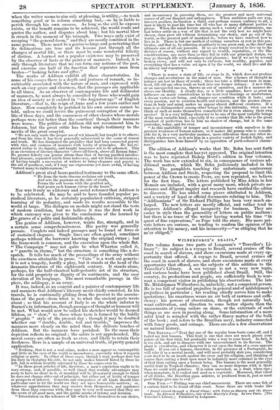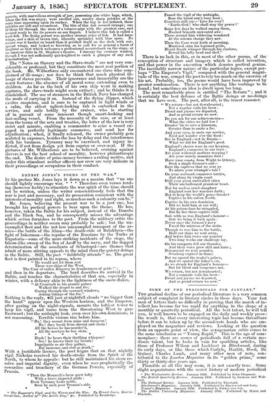'WILBERFORCE'S BRAZIL. * THIS volume forms two parts of Longman's "
Traveller's Li- brary" : its subject is a voyage to Brazil, several cruises off the coast in search of slavers, and shore excursions made at every op- portunity that offered. A voyage to Brazil, several cruises off the coast in search of slavers, and shore excursions made at every opportunity that offered, are the subjects of this addition to the Traveller's Library. A sea voyage is not a very new topic, and various books have been published about Brazil. Still, the country, its productions and people, are sufficiently fresh to war- rant a competent visitor in publishing his observations. The late Mr. Midshipman Wilberforce is, unluckily, not a competent person. He is too full of nautical prejudice in general and of midshipman's prejudices in particular ; his reading chiefly serves him to make quotations; his smartness wears an air both of rawness and suffi- ciency; his powers of observation, though not naturally bad, want cultivation, and direction to some better objects than the amusements of young sailors on shore, or the externals of such things as are seen in passing along. Some information of a more solid kind is mingled with the rather flimsy matter of the bulk of the book ; and refers to the Brazilian navy, industry connected with fancy goods, and coinage. There are also a few observations on natural history.
THE BANANA.—" Next day one of the regular bum-boats came off, and I tasted my first banana. This fruit is one that does not much please your palate at the first trial, but gradually wins a way to your heart. In fact, it is too rich, and apt to disagree with one unaccustomed to its flavour. The plant is cruciferous, and whenever it is cut open the form of a cross appears inside. If you cut a banana, therefore, in the presence of a Portuguese, he will take it as a mortal insult, and will most probably stab you, considering your deed to be an insult against the cross and his religion, and thinking of course that cuttin a fruit open must be infinitely more criminal in the eyes of God than cutting g open a human being. The banana is the most generally useful fruit in Tropical climates ; they can no more dispense with it there than we could with potatoes. It is eaten uncooked, as a fruit, when ripe ; when immature, it is cooked and used as a vegetable. Moreover, that vilest of all drinks, the Brazilian aqua ardente, is produced from it, just as most good things give rise to evil."
ODD FISH.—" Fishing was our chief amusement. There are some fish of a curious kind to be found off this coast. Some there are with beaks like • Brazil viewed through a Naval Glass; with Notes on Slavery and the Slave- trade. By Edward Wilberforce, late of her Majesty's Navy. In two Parts. [The Traveller's Library.] Published by Longmans. parrots, with marvellous strength ofjaw, possessing also white bags, which, when the fish was angry, were swelled out, sundry sharp prickles at the same time appearing upon its surface. When the bag is not inflated, these prickles are soft and recumbent. The bite of this fish seemed strange ; one of them bit through the stem of a tobacco-pipe with the greatest ease, and seemed ready to try its powers on our fingers. I believe this fish is called a toad-fish. The flying gurnet was another strange order of fish. It had large wings, and a skin of brown tint, liberally sprinkled with blue spots. No sooner was it hauled on board than it perched itself on the deck with out- spread wings, and looked so knowing as to call for as general a burst of laughter as that which welcomes a professional mountebank on the stage, or an amateur ditto in St. Stephen's theatre. I daresay the creature winked, though I was not sufficiently quicksighted to catch a glimpse of any such demonstration."
The "Notes on Slavery and the Slave-trade" are not very con- siderable or profound, but they constitute the most real portion of the book. Mr. Wilberforce only encountered one slave who com- plained of ill-usage; nor does he think that much physical ill- usage of slaves prevails. Their ignorance and immorality are the worst features ; the absence of all moral sense extending even to children. As far as the luck of his own ship went in making captures, the slave-trade might seem extinct ; and he thinks it is diminished. The use of steamers in the British Navy, has changed the mode of carrying it on. Instead of the flying clipper, which excites suspicion, and is sure to be captured in light winds or a calm, the oldest ugliest-looking tub is embarked in the service, and sails boldly by the cruiser, who is starting off in pursuit of some innocent though smart-looking and fast-sailing vessel. From the necessity of the case, or at least from the terms of the acts and treaties, the letter of the law is very strict and minute, enabling a commander to seize a vessel en- gaged in perfectly legitimate commerce, and send her for adjudication ; when, if finally released, the owner probably gets mulcted in expenses, besides the loss by delay and the interference with his business. Tyranny may be exercised, and injury in- flicted, if not from design yet from caprice or over-zeal. If the pictures of Mr. Wilberforce are to be believed, cruising against slavers is not the best school of morality, however philanthropic the end. The desire of prize-money becomes a ruling motive, and under this stimulant neither officers nor crew are very delicate in their proceedings or scrupulous in their conduct.











































 Previous page
Previous page